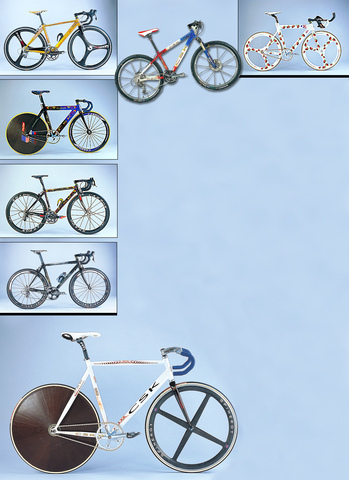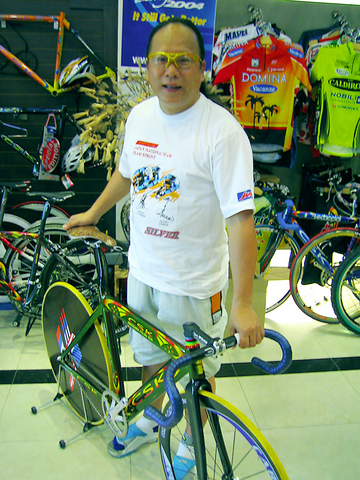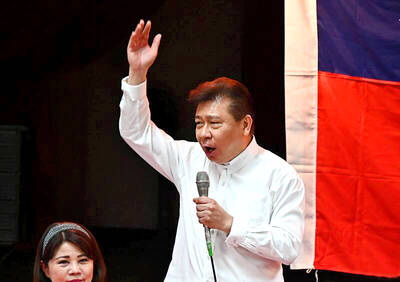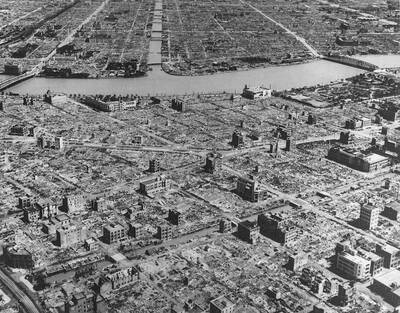In places like France or Beijing bikes are an important part of life and culture, but in Taiwan a bicycle is more often seen as a slower alternative to the scooter. It's easy to forget that Taiwan's bicycle industry leads the world in size.
Taiwan's bicycle industry was built on entrepreneurship rather than on a strong cycling tradition. Up until the end of World War II, the only bicycles in Taiwan were Japanese imports.
Since individual parts were unavailable, fixing broken bikes was a matter of resorting to whatever might be lying around: a bundle of cords for a tire, wooden blocks for pedals. After the war ended, a few businessmen began importing parts from abroad, and eventually Taiwan began to produce its own bicycle parts. In 1951 the government imposed controls on bicycle imports to foster Taiwan's growing industry.

But the nascent bicycle business was dealt a blow with the mass importation of 49cc Japanese motor scooters starting in 1968, and bicycles faded from importance in the local market.
The energy crisis of 1973 fueled demand for bicycles around the world and Taiwan's entrepreneurs leaped into action. Taiwanese bikes hit US markets for the first time, setting off an export boom that has remained strong, hitting a peak in the 1990s when Taiwan became the world's largest exporter of bicycles.
However, with China's emergence as the center of the universe in terms of cheap manufacturing, sheer production power is no longer enough to keep Taiwan on top.

PHOTO: MEREDITH DODGE, TAIPEI TIMESN
In an industry traditionally dominated by original equipment manufacturers (OEMs), a few larger firms such as Giant and Merida have shifted their focus to developing their own brands.
At a stockholders' meeting on June 16, Giant's CEO King Liu (劉金標) expressed his vision for the future: "Giant is already the world's largest bicycle company; however, Giant's goal is not to be No. 1, but rather be the only one. We must adopt unique management strategies and methods to create one-of-a-kind value."
The company's focus on brand consciousness and research and development has paid off with a gross take of NT$8.8 billion last year. However, as for "one-of-a-kind value," another Taiwanese bicycle maker has beaten them to the punch.
Chang Sheng-kai (
Chang's 20 years of cycling experience and an Asia championship crown puts credibility behind his brand. "I entered the cycling world in 1979 and my record of success was the best in Taiwan, so I got to know a lot of people," Chang said. "They trust my knowledge and they know that my designs will be correct," he said.
Chang decided to launch his own brand five years ago after the 921 earthquake destroyed his bike shop. "I turned a crisis into an opportunity," he said. His personal experience with 50 different brands had left him unsatisfied. "Each brand had its strengths and weaknesses: Some bicycles are very fast but heavy, so you can't ride them up Alishan; some bicycles are lighter but they won't go as fast when you get to the level roads because they're too soft," said Chang. He was confident he could design bicycles whose strengths were maximized and whose weaknesses were kept to an absolute minimum. However, he knew this could not be accomplished by coming up with one perfect design. Each cyclist is built differently and so must each bike.
A 150kg member of the South African national team gave Chang a particular challenge.
Chang said he was shocked when he went to check out the team after they had ordered his bikes. "In Taiwan we don't have riders this big," he said, "so I thought maybe my bikes aren't suitable for him because he was too tall and strong. But then I came back to Taiwan and designed a bike that would work for his size."
Designing a bicycle for different body types isn't as simple as just changing the size of the frame, Chang said. He explained the concept in terms of weaponry: a big Gwun blade (
It is this attention to detail and individual needs that Chang feels can help Taiwan produce the best bicycles in the world, instead of just producing the most. While the level of precision in Taiwanese factories leaves nothing to be desired, design originality continues to lag behind those of other countries.
"My foreign friends say the best bicycles are Italian or French, but those bicycles are not made in those countries, they are made in Taiwan," said Chang. The thing he feels is lacking in Taiwan's bike industry is not precision but the intimate knowledge of bicycles that only a cyclist possesses. Only a two or three of Taiwan's former cyclists have contributed their expertise to the industry, according to Chang.
Although Chang's ideals are impractical in the eyes of large companies like Giant who prefer mass production to custom design, the industry is learning to appreciate the need for creativity and innovation.
Merida President Ike Tseng (
"Unless Taiwan develops new and innovative types of bicycles," Tseng is quoted as saying on the company's Web site, "competition from China will make bicycles unprofitable. This is why the industry must develop new types of bikes and new materials, and jointly launch a new era of magnesium."
Taiwan's bicycle industry's new focus on increasing per-unit value through brand consciousness and innovation is paying off. Despite a decrease of 5.22 percent in the number of units exported during the first half of 2000 as compared with the same period in 1999, export value grew by 4.54 percent due to higher prices. The total exported units in 2004 increased by 11.98 percent from 2003 while export value increased by 23.6 percent.
Image is a powerful tool for success in the bike world where simple practicality has taken a back burner to athleticism and style.
While Giant is promoting its brand by sponsoring the T-mobile cycling team and providing them with specially made, top-of-the-line bikes, Chang Sheng-kai's reputation for artistic design has caught the eye of the White House.
"Next time you see [US president George W.] Bush riding his bike, look at the two guys riding along next to him and you'll see they're riding CSK bikes," said Chang. The former president of his high school art club takes pleasure in applying a unique paint job to each of his bikes, which can cost from NT$20,000 to NT$200,000, keeping in mind the wishes of the person who ordered it. Bush's secret service agents' bikes are painted in red, white and blue.
Chang's shop is located in Taipei at 60-2 Chongqing S Road, Sec 3 (

March 10 to March 16 Although it failed to become popular, March of the Black Cats (烏貓進行曲) was the first Taiwanese record to have “pop song” printed on the label. Released in March 1929 under Eagle Records, a subsidiary of the Japanese-owned Columbia Records, the Hoklo (commonly known as Taiwanese) lyrics followed the traditional seven characters per verse of Taiwanese opera, but the instrumentation was Western, performed by Eagle’s in-house orchestra. The singer was entertainer Chiu-chan (秋蟾). In fact, a cover of a Xiamen folk song by Chiu-chan released around the same time, Plum Widow Missing Her Husband (雪梅思君), enjoyed more

Last week Elbridge Colby, US President Donald Trump’s nominee for under secretary of defense for policy, a key advisory position, said in his Senate confirmation hearing that Taiwan defense spending should be 10 percent of GDP “at least something in that ballpark, really focused on their defense.” He added: “So we need to properly incentivize them.” Much commentary focused on the 10 percent figure, and rightly so. Colby is not wrong in one respect — Taiwan does need to spend more. But the steady escalation in the proportion of GDP from 3 percent to 5 percent to 10 percent that advocates

A series of dramatic news items dropped last month that shed light on Chinese Communist Party (CCP) attitudes towards three candidates for last year’s presidential election: Taiwan People’s Party (TPP) founder Ko Wen-je (柯文哲), Terry Gou (郭台銘), founder of Hon Hai Precision Industry Co (鴻海精密), also known as Foxconn Technology Group (富士康科技集團), and New Taipei City Mayor Hou You-yi (侯友宜) of the Chinese Nationalist Party (KMT). It also revealed deep blue support for Ko and Gou from inside the KMT, how they interacted with the CCP and alleged election interference involving NT$100 million (US$3.05 million) or more raised by the

More than 100,000 people were killed in a single night 80 years ago yesterday in the US firebombing of Tokyo, the Japanese capital. The attack, made with conventional bombs, destroyed downtown Tokyo and filled the streets with heaps of charred bodies. The damage was comparable to the atomic bombings a few months later in August 1945, but unlike those attacks, the Japanese government has not provided aid to victims and the events of that day have largely been ignored or forgotten. Elderly survivors are making a last-ditch effort to tell their stories and push for financial assistance and recognition. Some are speaking